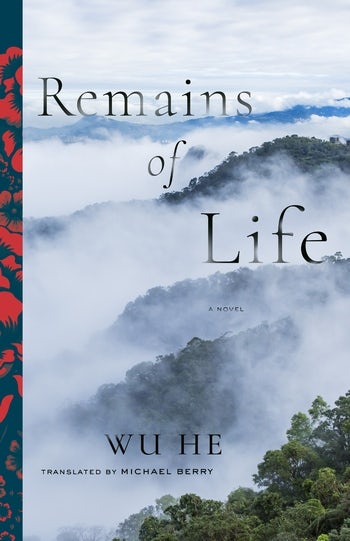Remains of Life
A Novel
Columbia University Press

Remains of Life
A Novel
Columbia University Press
On October 27, 1930, during a sports meet at Musha Elementary School on an aboriginal reservation in the mountains of Taiwan, a bloody uprising occurred unlike anything Japan had experienced in its colonial history. Before noon, the Atayal tribe had slain one hundred and thirty-four Japanese in a headhunting ritual. The Japanese responded with a militia of three thousand, heavy artillery, airplanes, and internationally banned poisonous gas, bringing the tribe to the brink of genocide.
Nearly seventy years later, Chen Guocheng, a writer known as Wu He, or "Dancing Crane," investigated the Musha Incident to search for any survivors and their descendants. Remains of Life, a milestone of Chinese experimental literature, is a fictionalized account of the writer's experiences among the people who live their lives in the aftermath of this history. Written in a stream-of-consciousness style, it contains no paragraph breaks and only a handful of sentences. Shifting among observations about the people the author meets, philosophical musings, and fantastical leaps of imagination, Remains of Life is a powerful literary reckoning with one of the darkest chapters in Taiwan's colonial history.
Nearly seventy years later, Chen Guocheng, a writer known as Wu He, or "Dancing Crane," investigated the Musha Incident to search for any survivors and their descendants. Remains of Life, a milestone of Chinese experimental literature, is a fictionalized account of the writer's experiences among the people who live their lives in the aftermath of this history. Written in a stream-of-consciousness style, it contains no paragraph breaks and only a handful of sentences. Shifting among observations about the people the author meets, philosophical musings, and fantastical leaps of imagination, Remains of Life is a powerful literary reckoning with one of the darkest chapters in Taiwan's colonial history.
Remains of Life is a novel of the first order. Welding experimental language and penetrating insights into history and memory, it transcends commonly used categories such as literary movements and schools. Remains of Life is not only a landmark in modern Chinese literature but truly an epochal accomplishment. Michelle Yeh, University of California, Davis
After spending ten years living in seclusion, Wu He began publishing a series of short stories, novellas, and novels that culminated in the publication of Remains of Life. The novel stands as a singular statement, at once profound and powerful, that could only come from the brilliant literary imagination of Wu He. Chu T'ien-wen, author of Notes of a Desolate Man
Wu He is one of the most innovative Chinese-language writers today, and Michael Berry is one of the best translators of Chinese. I cannot think of a modern or contemporary work of literature in the Chinese language that is comparable to Remains of Life. It deserves a place alongside great literary works dealing with genocide such as Austerlitz by W. G. Sebald. Lingchei Letty Chen, Washington University in St. Louis
A brilliant but immensely challenging work, of great interest to students of contemporary Asian fiction—and of the literature of atrocity and remembrance as well. Kirkus Reviews (starred review)
Thoughtfully and insightfully, Berry has devoted his translation to maintaining the novel’s original experimental writing techniques. . . . Reading this novel is an intellectually challenging and rewarding process. Yu Zhang, Asian Review of Books
Remains of Life is challenging but not unrewarding, and it is, of course, politically and historically important. . . . Some may enjoy the disruptive effects of its style, or the tale of a man haunted by history, or Wu He’s attempts to remember a forgotten people and to understand dreadful events. Remains of Life has all that, and more. Mike Cormac, South China Morning Post
Wu He's narrative is an outpouring, and only to a limited extent a story; the fascinating historical events and his encounters do make for an often engaging read, and his efforts to consider both the Mushu Incident and its aftermaths are fascinating. M. A. Orthofer, The Complete Review
A literary and translation feat. . . . Remains of Life is an important novel that touches upon the most profound aspects of life, with a depth and commitment that are all too rare in contemporary literature. Ilaria Maria Sala, Cha: An Asian Literary Journal
For those readers prepared to spend time on a challenging text, Wu’s novel will make for a wonderful experience. Less an examination of history than a reflection on the way ‘minority’ cultures are slowly being pushed aside by the majority, the work forces us to consider whether progress is always positive, and to think of what is being lost. Tony's Reading List
Remains of Life is a bold and unsettling search for a new way to represent life in the face of desolation. Chris Littlewood, Times Literary Supplement
Introduction
Remains of Life
Afterword
Notes
Remains of Life
Afterword
Notes
Commended, 2020 Patrick D. Hanan Book Prize for Translation, Association for Asian Studies
Long-listed, 2018 Three Percent, Best Translated Book Award in Fiction
